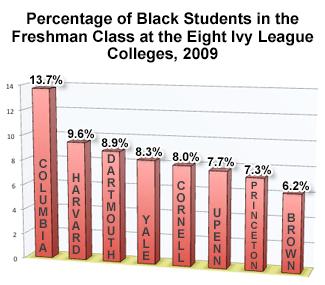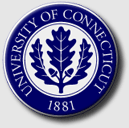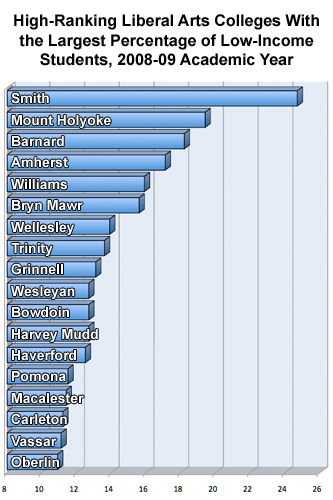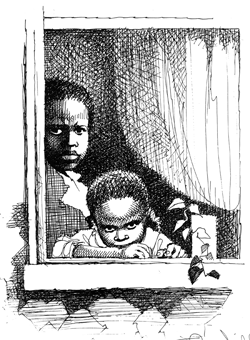Columbia Leads the Ivy League by a Large Margin in Black Freshman Enrollments
There are 190 black first-year students at Columbia University in New York City. They make up a whopping 13.7 percent of the freshman class. In 2008 there were 162 black first-year students at Columbia. They made up 12.1 percent of the entering class.
Columbia’s performance in enrolling black students is record-setting. This is the largest percentage of black students in the first-year class of any of the nation’s 30 highest-ranked universities or the 30 highest-ranked liberal arts colleges in the 17 years JBHE has conducted its annual survey of black freshmen at our leading educational institutions.
Columbia holds a wide lead over all seven other Ivy League colleges. Harvard has the second-highest level of black first-year students at 9.5 percent. Dartmouth ranks third at 8.9 percent.

Among the Ivy League institutions, Brown University has the lowest percentage of black students in its freshman class. Blacks make up 6.2 percent of the freshman class at Brown.
Black Enrollments Plummet at Louisiana State University
 African Americans make up nearly one third of the college-age population in the state of Louisiana. Yet blacks make up only 8.8 percent of the student body at the flagship campus of Louisiana State University in Baton Rouge. Furthermore, the number of black students at LSU has been decreasing in recent years. African Americans make up nearly one third of the college-age population in the state of Louisiana. Yet blacks make up only 8.8 percent of the student body at the flagship campus of Louisiana State University in Baton Rouge. Furthermore, the number of black students at LSU has been decreasing in recent years.
In 2002 there were 3,035 black students on campus. But since 2002 there have been fewer black students at LSU each year. In 2009 the figure dropped to 2,454. This is a decline of 19 percent from the 2002 high.
This fall blacks make up 8.8 percent of the undergraduate student body. In 2002 African Americans were 9.8 percent of all undergraduate students.
Ole Miss Takes Another Step to Sever Its Ties to Its Racist Past
 Several years ago the University of Mississippi had banned the flying of Confederate flags at football games. Six years ago Colonel Reb, the university mascot who has the appearance of a plantation owner, was banned from walking the sidelines at football games. Several years ago the University of Mississippi had banned the flying of Confederate flags at football games. Six years ago Colonel Reb, the university mascot who has the appearance of a plantation owner, was banned from walking the sidelines at football games.
Now the university has shortened one of its traditional fight songs played before every home football game. The song, “From Dixie With Love,” was shortened to exclude a stanza after which the football crowd responded with the chant, “The South will rise again.”
When the new, shorter version of the fight song was played for the first time this season, many fans in attendance continued to chant the old refrain. University of Mississippi Chancellor Dan Jones then stated that if the fans continued using the chant, he would not allow the song to be played at football games.
Historically Black Morgan State University Wins Fight to Prohibit the University of Maryland From Offering a Duplicative Doctoral Degree Program
 In 2005 Morgan State University, the historically black educational institution in Baltimore, sought unsuccessfully to prevent the establishment of a joint MBA program between the University of Baltimore and Towson State University. Morgan State argued that the new, duplicative MBA program would draw white students away from its own MBA program and, as a result, would serve to increase racial segregation in the state’s higher education system. Under a desegregation agreement with the U.S. Department of Education, Maryland is prohibited from establishing academic programs at predominantly white universities that are “unnecessarily duplicative” of programs at the state’s historically black universities. Morgan State lost the legal battle. Today the joint MBA program at Towson and the University of Baltimore enrolls far more students than the small program at Morgan State. In 2005 Morgan State University, the historically black educational institution in Baltimore, sought unsuccessfully to prevent the establishment of a joint MBA program between the University of Baltimore and Towson State University. Morgan State argued that the new, duplicative MBA program would draw white students away from its own MBA program and, as a result, would serve to increase racial segregation in the state’s higher education system. Under a desegregation agreement with the U.S. Department of Education, Maryland is prohibited from establishing academic programs at predominantly white universities that are “unnecessarily duplicative” of programs at the state’s historically black universities. Morgan State lost the legal battle. Today the joint MBA program at Towson and the University of Baltimore enrolls far more students than the small program at Morgan State.
This year Morgan State petitioned the state to end the online educational doctorate program for community college administrators initiated at the University of Maryland University College. Morgan State offers a traditional classroom-based doctoral degree program for community college administrators in which about 70 students are currently enrolled.
This time the state ruled in favor of Morgan State. The University of Maryland will not be permitted to offer its doctoral degree program to Maryland residents. Only students from outside the state can enroll in its online educational doctoral program.

UNIVERSITY OF CONNECTICUT

Administrative Services Specialist II (UCP IV)
The University of Connecticut, Department of Architectural & Engineering Services, is seeking applications for the position of Administrative Services Specialist II. Under general supervision, incumbent will provide assistance in coordinating capital projects paperwork flow and documentation; screen and review correspondence, records and other documents for accuracy, completeness and compliance with regulations, policies and procedures; complete and process administrative paperwork, technical documentation; and work with appropriate administrator to resolve unusual problems.
The successful candidate will be responsible for providing routine administrative support; coordinating administrative support functions for the department; performing capital projects paperwork flow; entering data into databases and computerized systems; preparing special and informational reports, task letters, technical documentation and related correspondence; supervising the maintenance and coordination of complex, manual and computerized filing systems; inputting documents into the AM Meridian/Blue Cielo automated document management system; responding to requests for information and providing assistance in solving a variety of problems based on knowledge of the University’s procedures, practices and past experience.
Minimum Qualifications: Associates degree or equivalent combination of education and experience; three to five years related experience; demonstrated knowledge of administrative record keeping and working with document management systems; excellent oral and written communications skills; ability to independently resolve problems of ordinary difficulty; good organizational and interpersonal skills; ability to multi-task; and familiarity with computer software including Microsoft Outlook, Word, Excel and Access.
Preferred Qualifications: Familiarity with any automated document management system; familiarity with design, engineering and construction processes and terminology; demonstrated experience with computerized spreadsheets and databases; and ability to set up budgets and other related reports are highly desirable.
This is a full-time position located at the main campus in Storrs, Connecticut. Salary will be commensurate with background and experience.
Send cover letter, resume and contact information of three professional references by mail only (no-e-mail submissions will be accepted) to: Search Committees, University of Connecticut, Architectural and Engineering Services, 31 LeDoyt Road, Unit 3038, Storrs, CT 06269-3038. Screening will begin immediately. (Search # 2010114)

After Six Years in Office, Mississippi Governor Appoints First Black Judge
 Malcolm Harrison was sworn in earlier this month as a circuit court judge in Hinds County, Mississippi, which includes the capital city of Jackson. Harrison is a graduate of Jackson State University. He earned his law degree at Samford University in Birmingham, Alabama. Malcolm Harrison was sworn in earlier this month as a circuit court judge in Hinds County, Mississippi, which includes the capital city of Jackson. Harrison is a graduate of Jackson State University. He earned his law degree at Samford University in Birmingham, Alabama.
What is notable about the Harrison appointment is that in nearly six years since taking office, Governor Haley Barbour has appointed more than two dozen judges to the bench in Mississippi. Harrison is the first African American.
It is important to note that about 35 percent of the population of the state of Mississippi is black.
  |
0 Number of states in 2007 where the white high school student dropout rate exceeded the dropout rate for black high school students.
21 Number of states in 2007 where the black high school student dropout rate was at least double the dropout rate for white high school students.
source: U.S. Department of Education
|
In Memoriam
Jenelsie Walden Holloway (1920-2009)
 Jenelsie W. Holloway, a longtime professor of art at Spelman College in Atlanta, died at a retirement home in Atlanta from complications of Alzheimer’s disease. She was 89 years old. Jenelsie W. Holloway, a longtime professor of art at Spelman College in Atlanta, died at a retirement home in Atlanta from complications of Alzheimer’s disease. She was 89 years old.
Professor Holloway was a 1941 graduate of Spelman College. She went on to pursue graduate studies at the Art Institute of Chicago. Before joining the Spelman faculty in 1952 she taught at Prairie View A&M University and Dillard University. After returning to Spelman she spent 38 years on the faculty until her retirement in 1990.
Honors and Awards
 • Donald E. Wilson, who recently announced his retirement as senior vice president for health sciences at Howard University, is the recipient of the 2009 Eagle Fly Free Award from the Institute for the Advancement of Multicultural and Minority Medicine. • Donald E. Wilson, who recently announced his retirement as senior vice president for health sciences at Howard University, is the recipient of the 2009 Eagle Fly Free Award from the Institute for the Advancement of Multicultural and Minority Medicine.
 • Stephen B. Davis, associate dean of students at Richard Stockton College in Pomona, New Jersey, received the Merit Award from the college’s Council of Black Faculty and Staff. • Stephen B. Davis, associate dean of students at Richard Stockton College in Pomona, New Jersey, received the Merit Award from the college’s Council of Black Faculty and Staff.
 • Cleveland L. Sellers Jr., president of Voorhees College in Denmark, South Carolina, received an honorary doctorate of civil law from Sewanee: The University of the South in Sewanee, Tennessee. • Cleveland L. Sellers Jr., president of Voorhees College in Denmark, South Carolina, received an honorary doctorate of civil law from Sewanee: The University of the South in Sewanee, Tennessee.
• John Harding Lucas, former president of Shaw University in Raleigh, North Carolina, won the 2009 Benjamin Elijah Mays Lifetime Achievement Award from the National School Boards Association.
• Tennessee State University, the historically black educational institution in Nashville, received the Higher Education Civic Engagement Award from the Washington Center for Internships and Academic Seminars. The award was given to the university for “engaging educators, staff, and students in activities that benefit their communities as well as themselves.”
Grants and Gifts
• Augusta State University in Georgia received a $20,000 grant from the Lumina Foundation to support a program to increase the college graduation rate for black males. Blacks make up 27 percent of the student body at the university.
• The Morehouse School of Medicine in Atlanta received a $500,000 grant from Kaiser Permanente of Georgia to support a workforce leadership program that is aimed at reducing racial health disparities.
• Historically black University of Arkansas at Pine Bluff received a $115,000 grant from the U.S. Department of Agriculture to implement a rural entrepreneurial program between agricultural cooperatives and businesses in the delta region.
• Jackson State University in Mississippi received a $750,000 grant from the U.S. Department of Health and Human Services to provide education and training services for the Mississippi Sudden Infant Death Syndrome (SIDS) African-American Outreach Project.
• Morris College, the historically black educational institution in Sumter, South Carolina, received a $1.5 million federal grant to fund the construction of new classrooms and laboratory space for science departments at the college.
• Virginia State University, the historically black educational institution in Petersburg, received a six-year, $3 million grant from the U.S. Department of Education. The funds will support the university’s master’s degree programs in engineering, biology, computer science, and mathematics.
• Historically black Fort Valley State University in Georgia received a $125,000 grant from the Shell Oil Company to support programs and to provide scholarships for students in degree programs related to the energy industry.
|

For breaking news and previews of upcoming articles
Ranking the Nation’s Most Selective Liberal Arts Colleges in Enrolling Low-Income Students
Over the past several weeks JBHE has reported the progress of our nation’s top-ranked universities in enrolling low-income students. Now we turn our attention to the highest-ranked liberal arts colleges.
It is important to note that in 2008-09, the most recent academic year for which Pell Grant data is available, the three liberal arts schools with the largest percentages of low-income students were women’s colleges. Five of the top seven in the percentage of low-income students on campus were women’s colleges. The women’s colleges that lead the nation’s highest-ranked liberal arts colleges in educating low-income students tend to have programs encouraging young single mothers to return to school to earn a college education. Undoubtedly, many of these women have low incomes and would readily qualify for federal Pell Grants.
Smith College in Northampton, Massachusetts, had the highest percentage of low-income students among the 30 highest-ranked liberal arts colleges. Mount Holyoke College and Barnard College ranked second and third.
Among the coeducational institutions, Amherst College and Williams College had the highest percentage of low-income students.
Washington and Lee University in Lexington, Virginia, had the lowest percentage of Pell Grant recipients among the 30 highest-ranked liberal arts colleges. At this school, only 4.5 percent of the undergraduates qualified for federal Pell Grants. At Davidson College, Colby College, Kenyon College, Bates Colleges, Colgate University, and Scripps College, fewer than 9 percent of the student body received federal Pell Grants.

  |
 “We’re doing what we’ve always done. We march. We protest. We file lawsuits. We fight for justice and equality. We’re just doing it better.” “We’re doing what we’ve always done. We march. We protest. We file lawsuits. We fight for justice and equality. We’re just doing it better.”
— Julian Bond, chair of the NAACP, in a lecture at Fisk University commemorating the 100th anniversary of the nation’s oldest and largest civil rights organization
|
Big Building Plans at Alabama State University
 William Harris, president of Alabama State University in Montgomery, has unveiled a new strategic plan for the campus of the historically black educational institution. Over the next decade, the university plans to complete more than $150 million in building projects including a life sciences building, a student center, student housing, a cultural center, a parking garage, a hotel and conference center, and a 32,000-seat stadium. William Harris, president of Alabama State University in Montgomery, has unveiled a new strategic plan for the campus of the historically black educational institution. Over the next decade, the university plans to complete more than $150 million in building projects including a life sciences building, a student center, student housing, a cultural center, a parking garage, a hotel and conference center, and a 32,000-seat stadium.
New Novel About a Young Black Woman Who Enters an Elite, Predominantly White University in the Late 1960s
 Angela Jackson, a poet and professor of African-American literature at Kennedy-King College in Chicago, has published her first novel. The book, Where I Must Go, tells the story of a working-class African American who enrolls at an elite university in the late 1960s. Although the school is named Eden University, it is clear from the details in the novel that the author is describing her alma mater, which is Northwestern University. Angela Jackson, a poet and professor of African-American literature at Kennedy-King College in Chicago, has published her first novel. The book, Where I Must Go, tells the story of a working-class African American who enrolls at an elite university in the late 1960s. Although the school is named Eden University, it is clear from the details in the novel that the author is describing her alma mater, which is Northwestern University.
Professor Jackson says the novel is part autobiography and part fiction. She entered Northwestern in 1968 but did not graduate until 1977. She later earned a master’s degree in Latina American and Caribbean studies at the University of Chicago.
Big Drop in Enrollment Creates Budget Crisis at Historically Black South Carolina State University
 South Carolina State University, the historically black educational institution in Orangeburg, had set a goal of expanding enrollment to 6,000 students by 2014. In the 2008-09 academic year, total enrollments stood at close to 4,900. South Carolina State University, the historically black educational institution in Orangeburg, had set a goal of expanding enrollment to 6,000 students by 2014. In the 2008-09 academic year, total enrollments stood at close to 4,900.
But the university’s plans were dealt a serious blow this fall when enrollments dropped to 4,545. The university reports that 300 first-year and transfer students who were expected to enroll, decided not to matriculate. Another 900 returning full- and part-time students did not come back to school this fall. Of these, 118 were seniors.
The university found that financial reasons were the major cause of the low retention rate. Many students simply did not have enough money to pay tuition and the university had used up all its available financial aid. Charles N. Davis, vice president for student affairs, told The State, a local newspaper, that “a lot of black families have not saved any money for school. They are very dependent on aid from the schools. Pell Grants are not going to cover the cost of your education, not totally.”
The loss in tuition income from lower enrollments will now force the university to make further budget cuts. The school is projecting a $6 million shortfall.
The First Black Woman to Lead an Adventist College
 Heather J. Knight was named president of Pacific Union College in Angwin, California. The college, which is affiliated with the Seventh-day Adventist Church, has nearly 1,300 students. The student body is 4 percent black. Dr. Knight is the first woman and first African American to lead Pacific Union College. And she is the first black woman to lead any Adventist college in the United States. Heather J. Knight was named president of Pacific Union College in Angwin, California. The college, which is affiliated with the Seventh-day Adventist Church, has nearly 1,300 students. The student body is 4 percent black. Dr. Knight is the first woman and first African American to lead Pacific Union College. And she is the first black woman to lead any Adventist college in the United States.
Dr. Knight was provost at Andrew University in Berrien Springs, Michigan. Previously she was a professor of English and associate provost at the University of the Pacific in Stockton, California.
Dr. Knight is a native of Jamaica who grew up in New York City. She is a graduate of Oakwood University in Huntsville, Alabama. President Knight holds a master’s degree in English from Loma Linda University and a Ph.D. in English from Stanford University.
Race, Education, and Hunger
A study conducted at the George Warren Brown School of Social Work at Washington University in St. Louis finds that 49 percent of all American children will at some time in their childhood be in a family that qualifies for food stamps. The study, published in Archives of Pediatrics and Adolescent Medicine, also found a huge racial disparity. According to the data, 90 percent of African-American children will at some time in their childhood be in a family that qualifies for food stamps. For whites, the figure is 37 percent.

The study found that black children in a single-parent family, whose head has less than a high school education, have a 97 percent chance of being in a food stamp family by age 10.
Appointments, Promotions, and Resignations
 • Janet Smith Dickerson, vice president for campus life at Princeton University, has announced that she will retire at the end of the current academic year. Dickerson has been an administrator at Princeton since 2000. She formerly was vice president for student affairs at Duke University and dean of Swarthmore College. • Janet Smith Dickerson, vice president for campus life at Princeton University, has announced that she will retire at the end of the current academic year. Dickerson has been an administrator at Princeton since 2000. She formerly was vice president for student affairs at Duke University and dean of Swarthmore College.
 • G. Dale Wesson was appointed vice president of the Division of Research, Economic Development and Public Service Activities at South Carolina State University. He was associate vice president of research at Florida A&M University. • G. Dale Wesson was appointed vice president of the Division of Research, Economic Development and Public Service Activities at South Carolina State University. He was associate vice president of research at Florida A&M University.
Dr. Wesson is a graduate of the Illinois Institute of Technology. He earned a master’s degree at Georgia Tech and a Ph.D. from Michigan State University.
 • Valerie L. Epps, vice president of student affairs at the University of the District of Columbia since June, has assumed additional duties as director of admissions and director of veterans affairs. Previously she was vice president for student affairs at Cheyney University. • Valerie L. Epps, vice president of student affairs at the University of the District of Columbia since June, has assumed additional duties as director of admissions and director of veterans affairs. Previously she was vice president for student affairs at Cheyney University.
Dr. Epps holds bachelor’s, master’s, and doctoral degrees in education, all from Southern Illinois University.
 • Valerie Tate Green was named chaplain at Clark Atlanta University. She is the first woman to hold the position of chaplain. She will also serve as a lecturer in the department of religion and philosophy at the university. She was the chaplain at Lincoln University in Pennsylvania. • Valerie Tate Green was named chaplain at Clark Atlanta University. She is the first woman to hold the position of chaplain. She will also serve as a lecturer in the department of religion and philosophy at the university. She was the chaplain at Lincoln University in Pennsylvania.
Dr. Green is a graduate of Georgia State University. She holds master’s and doctoral degrees from the Interdenominational Theological Center in Atlanta.
 • Joel L. Dawson, associate professor of electrical engineering at the Massachusetts Institute of Technology, was promoted to the position of Mark Hyman Jr. Career Development Professor at MIT. • Joel L. Dawson, associate professor of electrical engineering at the Massachusetts Institute of Technology, was promoted to the position of Mark Hyman Jr. Career Development Professor at MIT.
Professor Dawson holds bachelor’s and master’s degrees from MIT and a Ph.D. in electrical engineering from Stanford University.
 • Devyn Spence Benson was appointed assistant professor of Africana studies and history at Williams College in Williamstown, Massachusetts. Dr. Benson recently completed her Ph.D. at the University of North Carolina at Chapel Hill. • Devyn Spence Benson was appointed assistant professor of Africana studies and history at Williams College in Williamstown, Massachusetts. Dr. Benson recently completed her Ph.D. at the University of North Carolina at Chapel Hill.
|